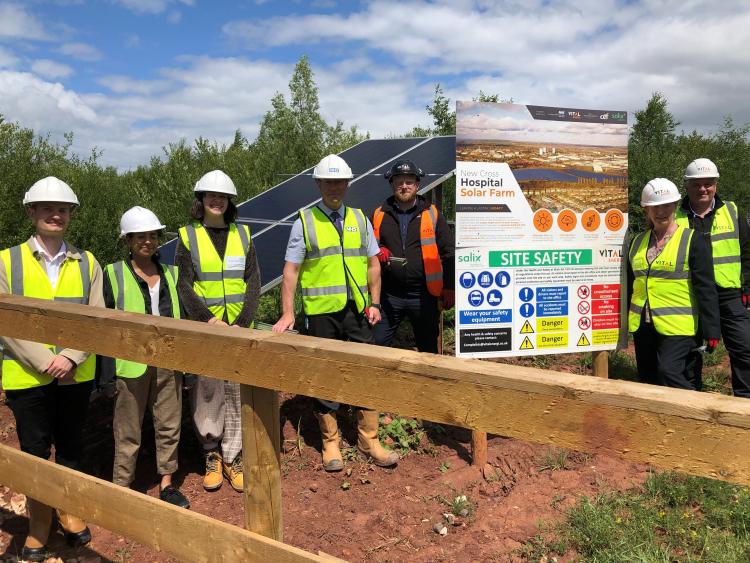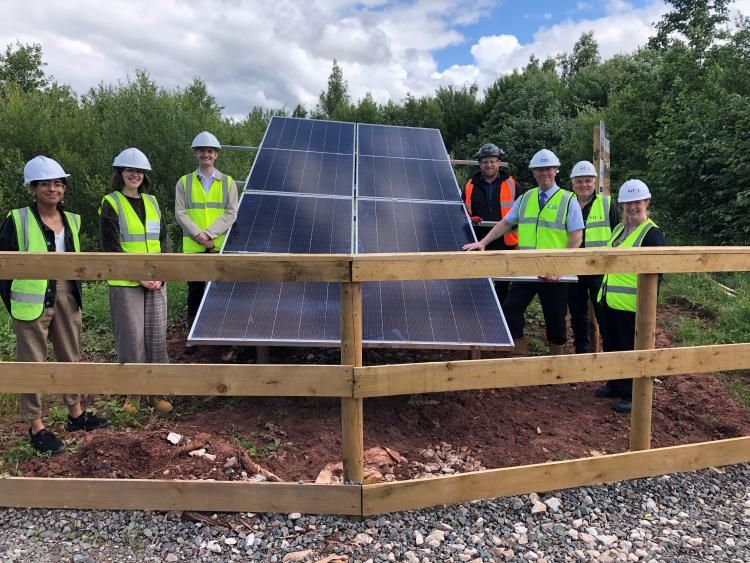Sun helps generate clean green energy at Wolverhampton hospital

More than 16,000 electricity generating solar panels are being installed at a new city solar farm to help power the whole of New Cross Hospital and save 1,450 tonnes of carbon a year.
The Royal Wolverhampton NHS Trust, and project partners, had to overcome a number of challenges – including badgers, methane, and anti-social behaviour - to prepare the brownfield site, which is more than 40 acres – the size of 22 football pitches.
The panels, which will all be installed by October, are part of a multi-million-pound investment, provided by Salix Finance, a government-funded body, to help power the hospital for three quarters of the year – around 288 days of self-generated renewable energy.
The new solar farm will save the Trust around £15 million-£20 million over the next 20 years; around £1 million a year, money which will be put back into frontline healthcare.
Stew Watson, Director of Estates Development at The Royal Wolverhampton NHS Trust, said: “We’re working really hard to meet the Trust’s and the NHS’s target to reach net zero carbon by 2040 and this investment is a huge boost to help us achieve that. Our primary focus as a Trust is always on the patient and these works ensure the Trust saves money on future energy bills, which we can then subsequently invest across other healthcare services.”

Salix Finance provided the Trust with nearly £10 million in 2021 and it recently received a further £33 million to carry out green energy works as part of the Department of Business, Energy and Industrial Strategy’s Public Sector Decarbonisation Scheme (PSDS).
Rob Gray, Project Manager from the CEF, said: “A lot of work has happened to get the site ready for the solar panels. Firstly, we had issues with the methane venting system, which is in place to release the gases from the waste material buried under the ground. Following surveys and an Environmental Agency inspection, the local authority undertook gas venting works and an additional drainage network was installed, to ensure water escaped correctly from the site to reduce standing water and flooding."
“Further to the surveys and clearing the land of trees, we also had to protect the badger setts on site by creating exclusion zones within the project for the badgers to continue to inhabit. Once the land was cleared, we installed 24 hour security.”
The solar panels are being installed, in part, to power the five air source heat pumps that are being installed at New Cross Hospital. Other energy efficiency measures taking place at the Trust include steam trap replacements, pipework insulation, LED lighting and window replacement.
Work has also began on the underground cabling which will connect the hospital to the solar farm. Helen Brindle, of Vital Energi explained the challenges of installing the one and a half miles of private wire from the solar site across the highway, a canal bridge and a busy road junction to the hospital. She said: “The underground cabling has to be dug through fields and the local highway from the solar farm to the hospital. This will take around four months to complete and will ensure a brand new clean, green energy source for the hospital.”
Jake Helliwell, from Salix Finance’s NHS team, said:
Stew and the team at The Royal Wolverhampton NHS Trust are particularly determined to carry out these works to improve the energy supply of the hospital, reducing their bills in the process and freeing up resources to improve patient care.
HEJ - Health Estate Journal



